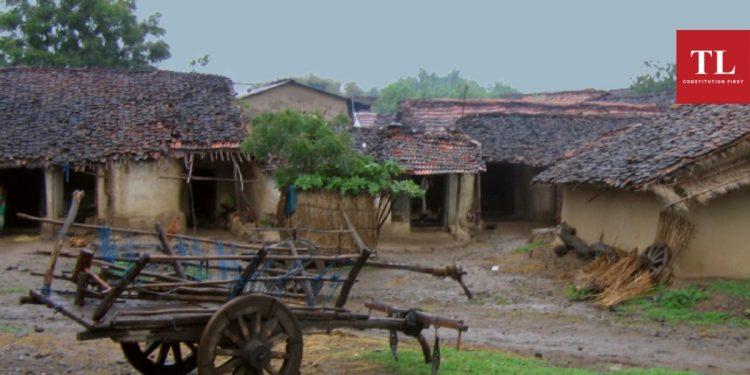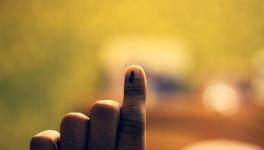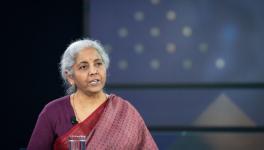Villages Ravaged by Pandemic as India’s Federal Structure Crumbles

The fast spread of Covid-19 to villages has shown the importance of co-operative federalism and panchayat raj institutions. However, they are at the mercy of states for funds, who in turn, are dependent on the centre for many things. The shortage of vaccines and the centre washing its hands off the whole issue has shown the vacuum in India’s federal structure, which has left its villages ravaged by the Covid-19 virus, write RISHABH SHUKLA & SHIVANGI SHUKLA
—–
The devastating impact of the second wave of Covid-19 and the bitter truth about the impending third wave is alarming to the federal structure of the country as presently, there are more than 306 districts with a positivity rate of 20 percent or higher.
The data not only shows how the pandemic has become more brutal in terms of mortality rate, but that the second wave has not only spread in urban areas, but rural ones too where more than 70 percent of India’s population resides.
Recently, the Allahabad High Court while hearing a case of anticipatory bail said that “the state government is having tough time in controlling the spread of corona virus in rural areas and it would be very difficult to carry out test, detect infections and treat the population in villages, as it lacks the resources for the same”.
Are Panchayats Ready?
This raises the question whether panchayats are ready to tackle the third wave. The reasons for this doubt are many. The gory spectacle of some 100 bodies of suspected Covid patients floating in the Ganga and said to have come from UP and Bihar shocked many. This clearly shows that the medical infrastructure in rural areas has collapsed and cremation grounds can’t keep up with the number of people dying.
The management of cremation grounds comes under the State List (entry 10 list 2). But due to the failure of state governments, villagers are forced to immerse the bodies of their loved ones in the Ganga. Secondly, schemes made by state governments seem to be effective only on paper. For e.g., the Pradhan Mantri Jan Arogya Yojana which was the world’s largest health insurance scheme, was never implemented properly and the promise of providing Rs 5 lakh per family per year for medical treatment in empanelled government and private hospitals was seen to be of little use during the pandemic.
There are other schemes launched by the government, but as columnist Harish Damodaran said: “While ‘schemes’ and their intelligent political marketing can help, they cannot substitute for anemic growth and falling incomes beyond a point”. The fallout of this was seen in Bengal where voters used their most lethal weapon—votes—to give a befitting reply to non-doers.
Missing in Action
Thirdly, an important pillar of democracy, the legislature, seems to be in limbo and is missing in action. However, the other pillar, the judiciary, is pro-active in dealing with the pandemic. While some may call it “judicial overreach”, its work, especially of high courts during the pandemic, has been appreciative.
The Parliament should take a leaf out of other democracies to carry out meetings and correct the mistakes of the centre in dealing with the pandemic, especially in allocating oxygen, vaccines and ICU beds to states.
As leader of the Opposition in the Rajya Sabha Mallikarjun Kharge said, Parliament should use technology to organise meetings and the option of holding virtual parliamentary standing committee meetings should be looked at.
The Indian political system is a federal structure since the inception of the Constitution. However, it was limited to the centre and states initially. Later, the Balwant Rai Mehta committee recommended introduction of a three-tier local self-governance system. The object was to decentralise power to the grassroots level.
Local Self-government
The 73rd and 74th constitutional amendments brought federalism beyond the centre-state level. The amendments promised to introduce local self-government at the village level, but the real picture is quite different.
Article 243G of the Constitution denotes that power and responsibility of panchayats shall be determined by the state legislature.
Further, under Article 243H, it is the state legislature which shall by law authorise panchayats to levy tax. In other words, it is like a typical Indian family where power is distributed between the grandfather (centre), father (state) and grandson (panchayat). How the grandson will be treated will be similar to how the father was treated by the grandfather.
Panchayats are at the mercy of the state government when it comes to finance and governing powers.
The centre cannot wash its hands off responsibility by saying that public health and sanitation come under the State List. The Epidemic Disease Act, the National Disaster Management Act and the Essential Commodities Act were invoked by the centre during the pandemic and it is its responsibility to provide right to life to its citizens.
Dependent on State Governments
During the pandemic, panchayat raj institutions (PRIs) have become more dominant. Entry 23 of the 11th Schedule provides that panchayats shall have power with regard to health and sanitation and this includes hospitals, primary health centres and dispensaries. Article 243G states that the state legislature may by law devolve such powers upon them. But PRIs are dependent on the state government.
Further, the whole idea of local self-government in villages is given to the state under the 7th Schedule.
If PRIs take the initiative to make rules with regard to health, they are handicapped due to non-availability of funds and have to depend on the state government.
Since the onset of the pandemic, villages had been most vulnerable. The government should have foreseen that if the virus spreads to rural areas it would be devastating. While the first wave did not spread too much to villages, the panchayat elections held during the second wave led to the quick spread of the virus.
Panchayat Polls
The conduct of elections to PRIs is the responsibility of state governments.
Recently, the Allahabad High Court issued a show cause notice to the State Election Commission to furnish reasons why Covid protocols were not properly issued due to which 135 officers died during the elections.
The spread of the virus in rural areas will impact the rural economy through supply chain disruptions in mandis despite the good harvest this year and forecast of a normal monsoon. It means that if India fails to provide adequate facilities to rural areas in dealing with the pandemic, it would seriously affect the production of food grains, resulting in shortage of agricultural commodities.
While co-operative federalism has been a boon to states, it has been a bane to local self-government institutions.
States are given a big say in policy making through the introduction of the NITI Aayog. The 14th Finance Commission had increased the share of states from 32% to 42%, but PRIs are still not accorded any role in cooperative federalism. They are still at the mercy of states for their finances.
The introduction of GST has provided a revenue opportunity to states, but PRIs are still out of the picture. Specific budgets are passed for PRIs, but it is state governments which do so.
Confrontational Federalism
However, with is evident now is a new term–confrontational federalism. The centre takes decisions without consulting states. An apt example is the abolition of Article 370 in J&K.
However, with the raging pandemic, the centre cannot act in isolation without states’ efforts. Co-operative federalism provides an autonomous status to states.
Another problem PRIs face now is that vaccination drives are centralised and even state governments are facing a shortage of vaccines. Recently, 11 states floated international tenders to directly purchase vaccines from the international market as the centre washed it hands off this issue.
The solution to these problems can be found only when the third tier is acknowledged in the federal structure. Funds to PRIs should be determined by administrative officers who must directly report to the centre. A central agency must audit the funds passed to PRIs.
(Rishabh Shukla & Shivangi Shukla are pursuing LLM from Dharmashastra National Law University, Jabalpur. The views expressed are personal.)
The article was originally published in The Leaflet.
Get the latest reports & analysis with people's perspective on Protests, movements & deep analytical videos, discussions of the current affairs in your Telegram app. Subscribe to NewsClick's Telegram channel & get Real-Time updates on stories, as they get published on our website.
























